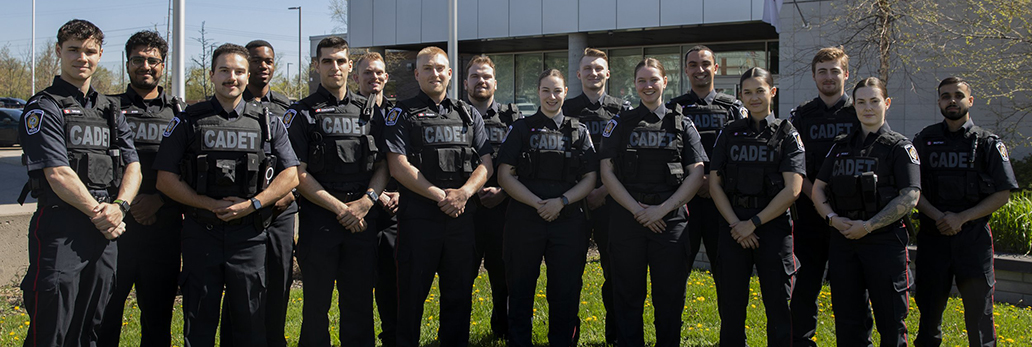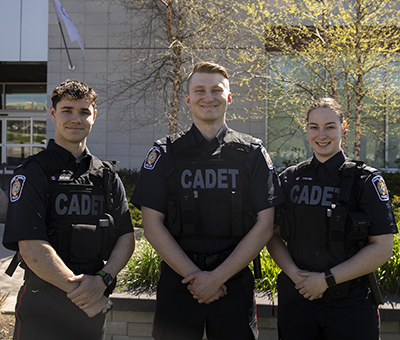
Due to the volume of applications received for the Cadet November intake, we are currently not accepting new applications. Please check back in 2026.
Role of a Police Cadet

- Work 12-hour shifts and follow the two days/two nights/four off schedule
- Receive internal training and continuously work alongside coaches/mentor officers
- Be part of a platoon team
- Patrol in all districts and Central Lock-Up
- Experience specialized units
- Support special events throughout the region
- Participate in and speak at Recruiting Information Sessions
- Learn new skills such as Defensive Tactics, Traffic Point Duty, and Search Training
- Work on fitness and wellness
Become a Police Cadet
The Halton Regional Police Service (HRPS) re-established its 12-month Police Cadet program in 2009. It sees participants undergo a structured and comprehensive selection process. Successful candidates are put through an internal training program, followed by a series of diverse assignments throughout the Service. The program is designed to provide Cadets with a window into policing as well as continual guidance and mentoring, with the goal of preparing them to advance to becoming a Constable.
Minimum Requirements |
|
To be considered for the position of police cadet, a candidate must:
International Credential Assessment Service of Canada World Education Services Canada (WES Canada) |
Additional Requirements |
|
The following additional mandatory requirements must be also be met to be considered for the position of police cadet:
|
Desired Qualifications |
|
Compensation |
|
Cadet | $57,379 |
Competencies of a Police Cadet
In addition to the minimum requirements, applicants for the position of Police Cadet must also possess the following competencies:
Essential Competencies |
|
Resiliency: The ability to withstand adversity and bounce back from difficult life events. The ability to retain perspective and cope after a stressful event. Teamwork: Works cooperatively with team members. Contributes to the development of a team environment where team members achieve established goals. Communication: Ability to demonstrate effective listening, understanding, verbal, and written communication skills with a goal of de-escalation or reaching a common ground Problem Solving: Identifies problems, implements solutions, and evaluates outcomes. Discovers new opportunities and solutions to problems using innovative thinking. Leadership: The ability to organize, influence, guide, and motivate other people to reach a shared goal. Inclusivity: Ability to recognize the value of diversity, and the capability to relate and work effectively in culturally diverse situations. |
Local Competencies |
|
Community Service Orientation: Desire to help or serve others, and the ability to focus efforts on meeting individual and group needs Initiative: Self-directed or self-motivated. Able to exercise initiative beyond what is expected or required on the job to improve outcomes or avoid problems. Work Organization: Ability to minimize errors and maintain high standards of quality by developing and maintaining effective systems for organizing work and information Cooperation: Ability to demonstrate collaborative/team-oriented behaviour such as seeking input and sharing information with colleagues, other emergency services, community resources, etc. Commitment to Learning: Ability to maintain and enhance professional/technical knowledge and personal development by asking questions, taking courses, reading, networking with colleagues, specialists, and the community Assertiveness: Ability to use personal power or the power of the police constable's position appropriately to set expectations, challenge others, enforce rules, and direct others |
 I Want To
I Want To




 Subscribe to this Page
Subscribe to this Page